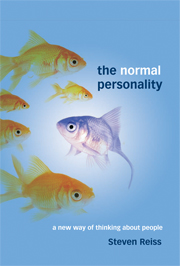Book contents
- Frontmatter
- Contents
- Acknowledgments
- Overview
- 1 My Wife Thinks Something Is Wrong with Me
- 2 The Sixteen Basic Desires
- 3 Intensity of Basic Motivation
- 4 Normal Personality Types
- 5 Overcoming Personal Troubles
- 6 Six Reasons for Adolescent Underachievement
- 7 Self-Hugging and Personal Blind Spots
- 8 Relationships
- 9 Reinterpretation of Myers-Briggs Personality Types
- 10 The Sixteen Principles of Motivation
- APPENDIX A Dictionary of Normal Personality Traits
- APPENDIX B Reiss Motivation Profile Estimator
- APPENDIX C The Sixteen Basic Desires at a Glance
- Notes
- References
- Index
6 - Six Reasons for Adolescent Underachievement
Published online by Cambridge University Press: 05 June 2012
- Frontmatter
- Contents
- Acknowledgments
- Overview
- 1 My Wife Thinks Something Is Wrong with Me
- 2 The Sixteen Basic Desires
- 3 Intensity of Basic Motivation
- 4 Normal Personality Types
- 5 Overcoming Personal Troubles
- 6 Six Reasons for Adolescent Underachievement
- 7 Self-Hugging and Personal Blind Spots
- 8 Relationships
- 9 Reinterpretation of Myers-Briggs Personality Types
- 10 The Sixteen Principles of Motivation
- APPENDIX A Dictionary of Normal Personality Traits
- APPENDIX B Reiss Motivation Profile Estimator
- APPENDIX C The Sixteen Basic Desires at a Glance
- Notes
- References
- Index
Summary
When students do poorly in middle or high school, their parents wonder what went wrong. They search for explanations, but sometimes none is apparent. Their child may have been an average or model student when he or she unexpectedly brought home failing grades, stopped turning in homework, started talking back to teachers, ran away, or befriended the wrong crowd. Some parents reach wits' end trying to figure out what happened to cause such behavior.
Harvey P. Mandel and Sander I. Marcus (1995) presented a compelling analysis of adolescent underachievement. Based on work with thousands of underachievers, they concluded that “Underachievers are, in fact, highly motivated – in directions other than getting good grades. And finding out precisely where their motivation lies is the key to helping them turn around and become achievers at school”(p. 3).
I will discuss six common motivational reasons for underachievement, each of which can be identified based on standardized test scores on the Reiss School Motivation Profile. Four of the six reasons are normal; only two are possible symptoms of a psychological disorder. In saying that underachievement is often the result of normal motivational forces, I am not saying that it is permissible for adolescents to get failing grades in school; rather, I am saying that the solution is not therapy for misdiagnosed or nonexistent disorders.
- Type
- Chapter
- Information
- The Normal PersonalityA New Way of Thinking about People, pp. 85 - 98Publisher: Cambridge University PressPrint publication year: 2008



